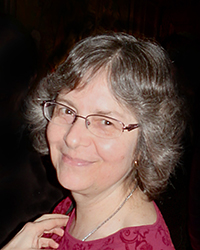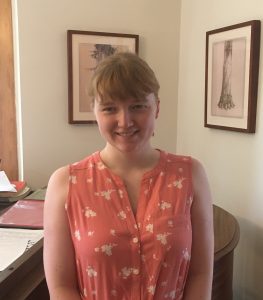Helen Rodd
Professor & EEB Graduate Coordinator
MSc (Toronto); PhD (York U); Postdoctoral Fellowships (Florida State U, UC Davis). See below for a brief C.V.

My main interests are in reproductive strategies: life history traits and sexual behaviour.
I study the role of frequency dependent selection (rare male advantage and predator search image) in maintaining the extreme, genetically-based variation in the colour patterns of male guppies. Other projects look at the role of sensory bias in mate choice decisions of female guppies, other poeciliids, goodeids and related species. I have also studied the ways in which individuals adjust their reproductive strategies to the behaviour and population demography (e.g., sex ratio, density) of conspecifics. My students, postdocs and I have investigated these questions in guppies and their relatives in the lab and in natural populations in Trinidad.
![]()
Current graduate students and recently graduated students
Abby Turner – MSc
Jess Bullock – PhD (starting Fall 2025)
Rebekah Jolicoeur Alfaro – MSc
 Gwendolyn Clark – MSc Gwendolyn is an NSERC-funded MSc candidate in the Rodd lab. She is interested in the ecological and environmental factors influencing mate preferences and the associated ornamental traits. She is currently using a meta-analytical statistical modelling approach to determine if the strength of female mate preferences for male carotenoid ornaments in guppies covaries with the prevalence of Gyrodactylus parasites.
Gwendolyn Clark – MSc Gwendolyn is an NSERC-funded MSc candidate in the Rodd lab. She is interested in the ecological and environmental factors influencing mate preferences and the associated ornamental traits. She is currently using a meta-analytical statistical modelling approach to determine if the strength of female mate preferences for male carotenoid ornaments in guppies covaries with the prevalence of Gyrodactylus parasites.
Anna Li – PhD Candidate
Maintaining genetic variation: Frequency dependent male reproductive tactics in the Trinidadian guppy (Poecilia reticulata).
Please see the Lab Alumni page for former students and postdoctoral fellows.

*********************************************************************************
Helen Rodd’s Brief C.V.
2010-Present Full Professor
Dept. of Ecology and Evolutionary Biology, University of Toronto
2003-2010 Associate Professor
Dept. of Zoology/Ecology and Evolutionary Biology, University of Toronto
1998-2003 Assistant Professor
Dept. of Zoology, University of Toronto
1996-1998 Postdoctoral Fellow
Center for Population Biology, University of California, Davis, CA
Supervisors: Drs. J.A. Stamps, M.L. Stanton
1994-1996 NSERC Postdoctoral Fellow
Dept. of Biological Science, Florida State University, FL
Supervisor: Dr. J. Travis
Ph.D. 1994 Biology Department, York University, Toronto
Phenotypic plasticity in the life history traits and sexual behaviour of Trinidadian guppies (Poecilia reticulata) in response to their social environment.
Supervisor: Dr. M.B. Sokolowski
M.Sc. 1982 Zoology Department, University of Toronto
A selective removal experiment on the meadow vole, Microtus pennsylvanicus.
Supervisor: Dr. R. Boonstra
